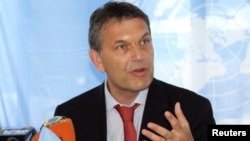Philippe Lazzarini, outgoing United Nations humanitarian chief for Somalia, said the country is on the right development trajectory following years of chaos but worries donor fatigue and insecurity continue to threaten its fragile progress.
For the past two years as humanitarian coordinator for Somalia, Lazzarini helped guide aid efforts to the country as it recovered from famine, and solidified the shape and function of a new government.
The Swiss diplomat, who concluded his second tenure in the position Thursday, said he sees positive signs all around.
“Mogadishu, for example, you couldn’t recognize. You have traffic jams, traffic lights. You have a new airport. You have one of the most modern hospitals of eastern Africa. You hear the hammer quite a lot and you have a number of people of the diaspora who have come back and are looking at investment possibilities," Lazzarini said.
Of course, some of the familiar challenges remain.
Al-Shabab militants continue to attack government and international actors across the country, greatly impeding humanitarian work.
Security a frustration
The security situation has been his main frustration, Lazzarini said.
“During my tenure, we have been directly targeted six times. We had seven international staff who perished. We had 10s of bystanders who have been killed and despite all the measures we are taking, we are still a target of this,” he said.
While the country has mostly recovered from the 2011 famine, the U.N. said about 730,000 people – about 10 percent of the population – still face acute food insecurity.
Lazzarini said the country needs continued international support to weather future shocks, but acknowledges that with so many other crises around the world, maintaining funding for Somalia is a challenge.
“We are aware that there is a competing environment, but we have also to make sure that this positive narrative in the making not be undermined by all of suddenly dropping … the humanitarian agenda," he said.
Lazzarini begins his new position, as the humanitarian coordinator for Lebanon, Aug. 1.
His replacement in Somalia, Peter de Clercq of the Netherlands, who previously served as the U.N. humanitarian lead in Haiti, is expected to begin July 12.




